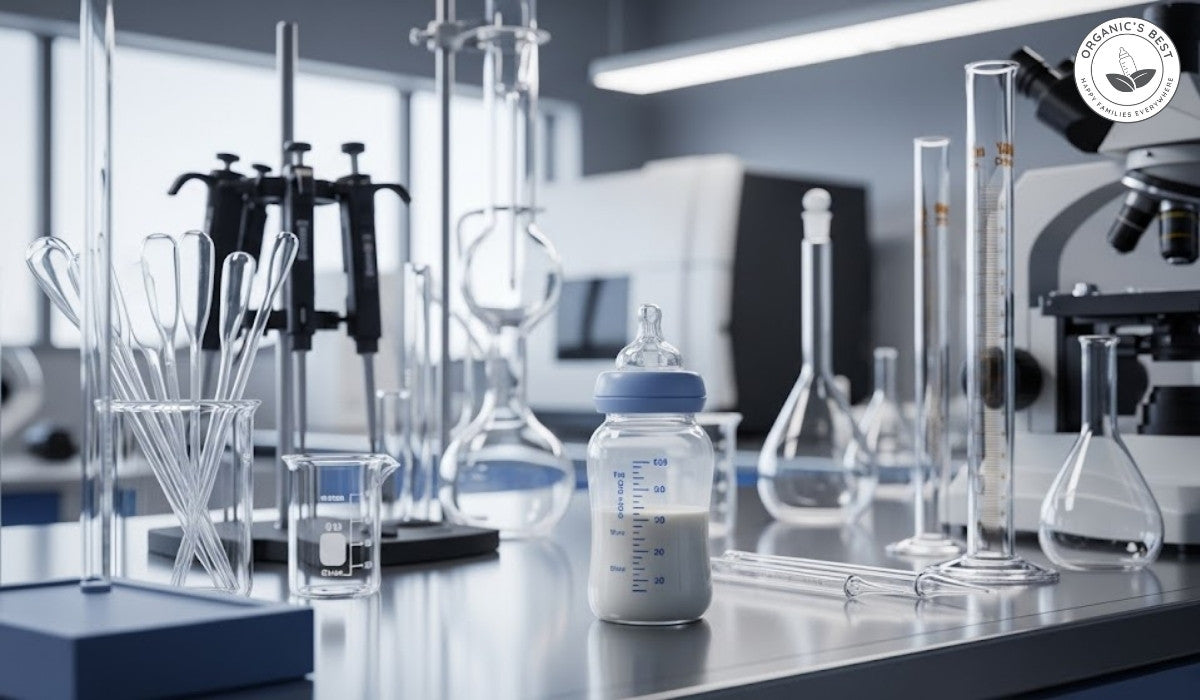Click to Get 2 FREE Boxes/Cans
Only New Customers! Click HERE to Get 2 Extra Boxes/Cans for Free With Your First Order.
BABY FORMULA
Offering new parents top-quality European infant formula from renowned brands like HiPP, Holle, Kendamil, and more. If you’re uncertain about which product to choose, our Formula Finder can help you make the best decision for your baby.
Baby Food
Offering new parents a premium selection of European baby foods, including jars, pouches, cereals, and snacks from esteemed brands like HiPP and Holle.
What is GMO in Formula Explained!
by Agustina Fernandez February 06, 2024 7 min read

As contemporary parents navigate the intricate maze of product labels, one term increasingly troubles them: GMOs, short for Genetically Modified Organisms. This acronym has become a source of both controversy and confusion, especially in products intended for our youngest family members.
But what is GMO in formula, and are GMOs really a cause for concern? Let's embark on a journey to explore this complex and often contentious topic, shedding light on what every parent should understand about GMOs in infant formula!
Table of contents
- Getting to the Basics: What are GMOs?
- Why are GMOs in Baby Formula?
- The GMO Controversy: Why Some Parents Are Concerned
- Benefits of GMOs in Formula: Are there any?
- Label Decoder: How to Identify GMOs in Baby Formula
- Non-GMO Infant Formula: What are the Alternatives?
- Making an Informed Choice for Your Baby
Getting to the Basics: What are GMOs?

GMOs are living organisms whose genetic material has been altered in a way that does not occur naturally through mating or natural recombination. This genetic modification is achieved by introducing foreign genes into the organism, thereby giving it specific traits or characteristics that may not be present in its natural state.
Brief History: How and Why GMOs Came Into Existence
The history of GMOs traces back to the mid-20th century when scientists began exploring genetic engineering techniques.
The primary motivation behind creating GMOs was to enhance agricultural productivity, increase crop resistance to pests and diseases, and improve the overall quality of crops. This was seen as a way to address growing global food demands and reduce reliance on chemical pesticides.
The first genetically modified plant, a tobacco plant, was successfully altered in 1983, and since then, genetically engineered organisms have become prevalent in the agricultural sector.
Common GMOs in the Agricultural Sector
GMOs have significantly impacted the agricultural industry, and some of the most common genetically modified crops include corn (maize), soybeans, cotton, and canola. These crops have been genetically modified to exhibit traits such as resistance to specific herbicides or pests, increased nutritional value, or improved shelf life.
As a result, GMOs have become integral to various aspects of the food supply chain, from processed foods to animal feed. As globalization continues to spread, concerns about the use of genetically modified organisms in infant formulas are gaining attention. Genetic engineering processes can be imprecise and random, potentially leading to unintended consequences in plants' growth, development, and functions.
To address these concerns, the terms "Non-GMO" or "GMO-free" are often used to indicate that a product does not contain ingredients modified through gene splicing techniques to induce desirable traits. Certified organic foods often bear a seal, while non-GMO products may or may not explicitly state their status on the label.
Why are GMOs in Baby Formula?
One of the primary reasons GMOs are used in infant formula is their cost-effectiveness and ability to increase production. Genetically modified crops often yield higher quantities and are more resistant to pests and adverse weather conditions.
This results in a more reliable and affordable source of ingredients for infant formula. In an industry where consistency and affordability are crucial, GMO crops provide a practical solution for meeting the high demand.
GMOs can also be used to enhance the nutritional value and shelf life of infant formula. Genetic modifications can be employed to fortify the formula with specific nutrients or to improve the stability and preservation of the product. This helps ensure that the formula meets the nutritional needs of infants and remains safe and effective throughout its shelf life.
However, the use of GMOs in infant formula has raised concerns among parents and consumers, leading to increased demand for non-GMO formula or GMO-free alternatives. As a result, the presence of GMOs in infant formula remains a topic of ongoing debate and scrutiny.
The GMO Controversy: Why Some Parents Are Concerned
Now, let's discuss some of the food safety concerns surrounding GMOs.

1. Allergenicity
Introducing unknown genes through genetic engineering can increase food sensitivities, potentially leading to food allergies later in life. Moreover, genetic engineering has the potential to transfer allergies from one food source to another, exemplified by the introduction of a nut gene into soybeans, leading to allergic reactions in individuals allergic to nuts.
2. Toxicity
Genetically engineered organisms could increase or introduce new food toxins.
3. Nutritional Changes
Genetically modified ingredients could alter or decrease the nutritional value of food products.
4. Antibiotic Resistance
Genetically engineered organisms may contribute to the growing issue of antibiotic resistance.
5. Labeling
Lax labeling laws may result in fewer restrictions on GMO use, making it harder for consumers to know what’s in their products. If you prefer to avoid GMO ingredients in infant formulas and other baby food products, be sure to look for an organic certification that prohibits GMOs or non-GMO labels.
6. Environmental Concerns
Genetic engineering in agriculture often involves creating crops that are resistant to specific pesticides. This has led to increased pesticide use in some cases, which can have environmental and health implications. Moreover, the overuse of specific pesticides can contribute to the development of pesticide-resistant "superbugs" that may pose a long-term threat to the ecosystem.
Benefits of GMOs in Formula: Are there any?

Now that we have covered the potential downsides of GMOs, you may be wondering why GMO ingredients might be used in infant formulas.
There are three main reasons why GMO infant formula is available on the market:
#1 Enhanced Nutrition
Genetic engineering allows for the enrichment of baby formula milk with essential vitamins and minerals that might be lacking in natural ingredients. This can be especially crucial in regions where access to diverse and nutrient-rich foods is limited.
By genetically modifying certain ingredients, such as milk protein, formula manufacturers can create products that more closely mimic the nutritional composition of breast milk, thereby addressing malnutrition concerns.
#2 Reduced Waste
GMOs can be engineered to have improved shelf life and increased resistance to spoilage. In the context of baby formula, this translates into reduced product waste. Longer shelf life means that formula can be safely stored for more extended periods, reducing the likelihood of it expiring before use. This is not only economically advantageous but also ensures that the formula is readily available for parents when needed.
#3 Potential Cost Savings
Genetically modified ingredients may lead to more affordable baby formula for consumers.
Label Decoder: How to Identify GMOs in Baby Formula
One effective strategy for discerning the presence of GMOs in baby formula is to gain a comprehensive understanding of food labels and certifications.
In the European Union, for example, organic baby formula regulations prohibit the use of GMOs in products certified as organic. This regulation provides parents with a reliable indicator of non-GMO status.v
Additionally, The Non-GMO Project Verified label, a widely recognized certification, signifies that a product has met stringent non-GMO standards. This certification has gained the trust of many consumers who are concerned about GMOs in their baby's nutrition.
Misleading Marketing Jargon to be Wary of
In the quest to identify non-GMO baby formula, parents should exercise caution when encountering marketing jargon that can be misleading. Terms like "natural," "pure," or "wholesome" may appear on labels and in advertising, but they do not necessarily guarantee that it is non-GMO infant formula.
Instead, scrutinize labels, seek out trustworthy certifications, and prioritize credible sources of information to gain a more accurate understanding of a formula's GMO content.
Non-GMO Infant Formula: What are the Alternatives?
A popular alternative to GMO-containing formulas is to opt for a European organic formula, such as those offered by reputable brands like HiPP and Holle. These brands adhere to strict organic regulations set forth by the European Union, which prohibit the use of GMOs, and their organic formula may be right for your family.
Non-GMO and Organic Baby Formula: Is There a Difference?
In Europe, organic certification for infant formula or food automatically implies a GMO-free status. This is because European organic regulations strictly prohibit the use of genetically modified organisms. So, even if a product doesn't advertise its GMO-free status, as long as it's certified organic in Europe, it won't contain GMOs.
Organic labels cover a wider range of standards beyond just GMOs. If parents are specifically concerned about GMOs, they can either opt for organic formulas or seek products that are explicitly non-GMO certified.
While both organic and non-GMO infant formulas tend to be pricier than conventional ones, parents should assess whether the benefits align with their infant's needs and their budget. It's also worth noting that the availability of these high-quality formulas can vary by location. However, these products and other organic foods for babies are readily available for purchase online in our Organic's Best shop.
Making an Informed Choice for Your Baby
When it comes to choosing the right formula for your baby, it's crucial to weigh the pros and cons carefully. Consider factors such as the nutritional benefits, cost, and the presence of GMOs and other contentious ingredients such as corn syrup. Evaluate what matters most to you and your family and how it aligns with your values and priorities.
Remember also to seek guidance from healthcare professionals who can provide valuable insights into the best formula options for your baby. Their expertise can help you make an informed decision based on your baby's unique needs and any specific health considerations.
Finally, recognize that the field of GMO research is continuously evolving. Stay informed about the latest findings and developments related to GMOs in infant nutrition. Research can shed new light on the potential benefits and risks, allowing you to make informed choices that reflect the most up-to-date knowledge about GMOs and their impact on your baby's health.
Conclusion: What is GMO in Formula?
It's vital to acknowledge that every parent's journey is unique, and the choices we make for our children reflect our individual circumstances and beliefs. Whether you opt for European formulas with organic ingredients, non-GMO products, or other alternatives, it's essential to respect the diversity of parental choices, knowing that every parent has the well-being of their child at heart!
|
Disclaimer: Please be aware that this information is based on general trends in babies, and it is not medical advice. Your doctor should be your first source of information and advice when considering any changes to your child’s formula and when choosing your child’s formula. Always consult your pediatrician before making any decisions about your child’s diet or if you notice any changes in your child. Breastfeeding is the best nutrition for your baby because breast milk provides your child with all the essential nutrients they need for growth and development. Please consult your pediatrician if your child requires supplemental feeding. |
Agustina Fernandez
Dr. Agustina Fernandez earned her medical degree from the prestigious Universidad Nacional de Córdoba, Argentina. With a deep-rooted passion for pediatrics, Dr. Fernandez is currently on the path to specializing in children's healthcare. Recently, she has delved into the vital field of infant nutrition. Her research interests include breastfeeding, infant formula, and baby food in little ones’ formative years. Dr. Fernandez's commitment to this area of study underscores her dedication to ensuring the health and well-being of children from their earliest days.
Leave a comment
Comments will be approved before showing up.
Also in Organic Infant Nutrition and Health Blog

Infant Feeding Guide for New Dads: Bottle Feeding Tips
by Agustina Fernandez February 10, 2026 10 min read
Read More
Spilled Milk: Feeding Unfiltered with Hayley
by Agustina Fernandez February 04, 2026 4 min read
Read More
Baby Bath Guide: How to Bathe a Newborn
by Agustina Fernandez February 03, 2026 8 min read
Read More
Reviewed by Dr. Bardha Qerimi, MD
-

Dr. Bardha Qerimi: Medical Reviewer of Organic's Best Blog
Dr. Bardha Qerimi completed her medical studies at the University of Prishtina in Kosovo, where she began her journey into the field of medicine. She has since developed a career in medical research, contributing to projects with notable organizations, including the World Health Organization (WHO).
